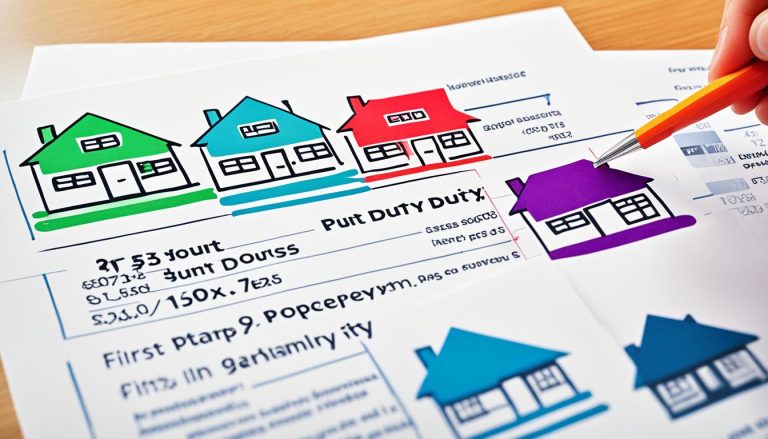Council housing in the UK exists to provide secure, affordable homes for those in genuine need. However, when tenants abuse the system by not living in their allocated property, it prevents others from accessing essential housing support.
Understanding how to report someone not living in their council house is crucial in maintaining fairness and accountability within the system. This guide outlines how councils identify housing fraud, how to report it, and what steps are taken when misuse is discovered.
What is Council Housing Fraud and Why Is It a Serious Offence?
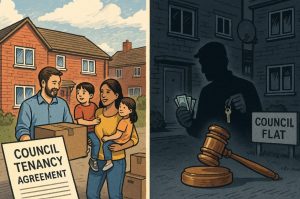
Council housing fraud refers to the misuse of social housing, typically provided at a subsidised rate, by individuals who intentionally breach the rules of tenancy. This misuse directly undermines the fairness and integrity of the public housing system in the UK.
There are various forms of housing fraud, including:
- Providing false information when applying for housing, such as fabricating family circumstances
- Subletting the entire property or parts of it without permission
- Continuing to live in a property after the legitimate tenant has died, without succession rights
- Leaving the property unoccupied while living elsewhere
These actions are serious offences under the Prevention of Social Housing Fraud Act 2013. If a tenant is found guilty, they can face legal consequences such as:
- Losing their tenancy
- Being permanently barred from applying for council housing
- Receiving a fine or being prosecuted, with the possibility of imprisonment
The misuse of council housing places undue pressure on the housing system, contributing to longer waiting times for eligible individuals and families.
How Do Councils Detect If a Tenant Is Not Living in Their Council House?
Local authorities have the legal authority and tools to identify fraudulent tenancy activities. The detection process is both proactive and reactive, combining internal data checks with community intelligence.
Methods Used by Councils:
| Detection Method | Description |
| Data Matching | Cross-referencing tenant records with systems such as the Electoral Roll, Housing Benefit records, and Council Tax databases to identify inconsistencies. |
| Unannounced Property Visits | Housing officers may conduct surprise inspections to confirm the resident matches council records. |
| Identity Verification | Tenants may be asked to produce documents like photo ID, utility bills, or tenancy agreements to prove residency. |
| Community Reports | Neighbours or members of the public can report suspicious behaviour, triggering investigations. |
Investigations are confidential, and councils are not required to notify tenants prior to conducting checks. The process may also involve checking for signs of abandonment, such as post piling up, or the presence of unfamiliar occupants.
Why Should You Report Someone Misusing Their Council House?
Social housing fraud harms the entire community by reducing the availability of homes for people who genuinely need them. Councils receive limited housing stock and rely on accurate tenancy management to ensure fair distribution.
Failing to report known fraud enables offenders to continue benefiting from housing they are not entitled to, while vulnerable families remain on long waiting lists. Housing fraud can also result in financial loss for local authorities, which affects funding for other essential services.
By reporting, individuals help maintain transparency in the system, protect public resources, and support those genuinely in need of housing assistance.
How Can You Report a Council Tenant Who Doesn’t Live at the Property?
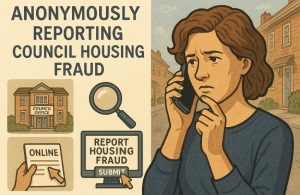
If you suspect someone is no longer residing in their council property or is unlawfully subletting it, you can file a report with your local authority. The process is simple, and in most cases, you are not required to provide your personal details.
Reporting Options:
| Method | Description |
| Telephone Hotline | Most councils have a dedicated housing fraud line. These are usually listed on the official council websites. |
| Online Form | Secure and often anonymous forms are available via council portals for reporting suspected fraud. |
| Email or Post | Some local authorities accept written reports addressed to their fraud investigation departments. |
When submitting a report, the following details will increase the chance of a successful investigation:
- Full address of the property
- Nature of the suspected fraud (e.g. abandonment, subletting)
- Description of occupants, if known
- Dates and times of unusual activity or prolonged absence
- Any supporting evidence, such as photos or notes
What Evidence Should You Collect Before Making a Report?
Although evidence is not required, having credible observations can assist the investigation. Councils appreciate well-documented tips, especially when they help confirm that fraud may be occurring.
The most valuable types of evidence include:
- Indications the property is unoccupied (e.g. full mailbox, no lights, overgrown garden)
- Unknown individuals living in or frequently accessing the property
- Statements or posts on social media suggesting the tenant lives elsewhere
- Consistent absence of the named tenant for long periods
Do not attempt to gather evidence in a way that could be considered harassment or trespassing. Observations should be made from public areas and should not involve direct confrontation.
Can You Report Council Housing Fraud Anonymously in the UK?
Yes. Local authorities accept anonymous reports and encourage them as part of broader fraud prevention strategies. This option is ideal for residents who wish to report suspicious behaviour without drawing attention to themselves.
When reporting anonymously:
- Avoid including any personal identifiers unless necessary
- Try to be as factual and specific as possible
- Focus on what was observed, not assumptions or rumours
Your identity will not be disclosed during or after the investigation, even if you choose to provide your contact information for follow-up. Councils are bound by privacy and data protection laws.
What Happens After You Report Suspected Council Housing Fraud?
After a report is submitted, the council initiates a multi-step process to assess and investigate the claim.
Investigation Timeline:
| Stage | Description |
| Initial Assessment | The housing fraud team reviews the report and supporting information to determine its credibility. |
| Investigation Launch | If warranted, council officers may conduct visits, check official records, and interview potential witnesses or occupants. |
| Evidence Collection | Further evidence is gathered to substantiate the claim. This may include surveillance, photographs, or interviews. |
| Legal Review and Action | If fraud is confirmed, the council may begin legal proceedings, such as serving a notice of eviction or involving the police for prosecution. |
Depending on the complexity of the case, investigations can take several weeks or even months. The individual who made the report is typically not informed of the outcome, due to confidentiality.
Are There Any Legal Risks for Reporting Someone?
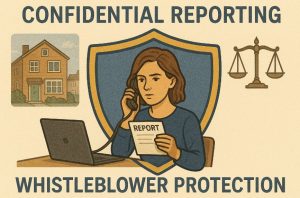
For individuals who report in good faith, there are no legal risks. Councils welcome information from the public, especially when it relates to the misuse of public resources.
However, false or malicious reports can have consequences. If someone deliberately makes a false claim with the intent to cause harm or disruption, they may be subject to legal action under defamation or harassment laws.
To avoid complications:
- Only report what you have personally observed or verified
- Avoid speculation, exaggeration, or including irrelevant personal issues
- Do not engage with the suspected tenant or attempt to enforce the rules yourself
Whistleblower protections may apply if you are employed in a housing-related role and are reporting fraud as part of your duty.
How Can Local Communities Help Prevent Housing Fraud?
Community awareness and vigilance are key in preventing and reducing housing fraud. Neighbours and residents are often the first to notice when something seems off about a property.
Here’s how local communities can contribute to prevention:
- Educate tenants about the consequences of tenancy fraud through community newsletters and forums
- Encourage responsible housing behaviour and communication between tenants and local housing officers
- Partner with neighbourhood watch groups to monitor properties discreetly
- Report concerns to the council promptly, allowing early intervention
Councils often hold public awareness campaigns and may provide materials for community groups to distribute. By working together, communities can play an active role in maintaining the integrity of the social housing system.
What Are the Most Common Types of Council Housing Fraud in the UK?
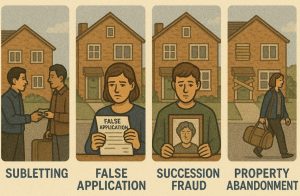
Council housing fraud is a growing concern across the UK, with thousands of cases investigated each year by local authorities. These fraudulent acts not only breach tenancy agreements but also prevent vulnerable individuals and families from accessing much-needed homes. Understanding the most frequent forms of housing fraud helps in recognising and reporting misuse effectively.
Subletting Without Permission
One of the most widespread types of council housing fraud involves tenants subletting their property, either partially or entirely, without the consent of the local authority. This practice is illegal, as council homes are meant for the named tenant and their immediate family only.
In many cases, tenants profit by renting out their council home at a higher market rate while living elsewhere, sometimes even owning a second property. Councils actively investigate such cases, and tenants caught subletting can face immediate eviction and prosecution.
False or Misleading Housing Applications
Providing false information when applying for a council house is another serious offence. Applicants may lie about their living situation, income level, number of dependants, or existing property ownership to gain unfair access to housing.
For example, an individual might claim to be homeless or living in overcrowded conditions when they are not. Others may hide assets or fail to declare a partner living with them. Councils verify application details through background checks and inter-agency data sharing to catch inconsistencies.
Unauthorised Succession or Tenancy Takeover
When a council tenant passes away, only certain family members—such as a spouse or civil partner—have the legal right to take over the tenancy, known as succession. However, unauthorised individuals may continue living in the property without informing the council, effectively taking over the tenancy unlawfully.
This type of fraud is often difficult to detect but is taken seriously, especially when someone continues occupying the property without entitlement, denying the council an opportunity to reassign the home.
Abandonment of the Property
Some tenants move out of their council property permanently but fail to notify the local authority, often to retain tenancy status or to sublet illegally. In such cases, the property may appear empty or be occupied by people not listed on the tenancy agreement.
Abandonment is considered a misuse of public resources, particularly in areas where housing demand is high. Councils monitor these properties through inspections and reports from neighbours or housing officers.
Right to Buy Misuse
In the UK, council tenants may be eligible to purchase their homes through the Right to Buy scheme. Fraud can occur when tenants falsely claim to be living in the property to meet eligibility requirements. In some instances, applicants use false documents or claim residency to secure large discounts under the scheme.
This not only defrauds the system but also results in the permanent loss of social housing stock, affecting the availability of affordable homes for future applicants.
Conclusion
Council housing is a vital resource that must be allocated fairly and responsibly. When someone misuses a council property, it’s not just a breach of trust—it directly affects those waiting for safe and affordable accommodation.
By understanding the signs of fraud and knowing how to report it, you contribute to a fairer housing system in the UK. Whether you’re a concerned neighbour, a housing professional, or a community member, your actions can help ensure that social housing serves its intended purpose.
FAQs
What is the penalty for subletting a council house without permission?
Subletting without permission is a serious offence and may lead to eviction, a fine, or even criminal prosecution. In some cases, tenants may be banned from applying for council housing again.
Can someone live in a council house if their parent has passed away?
Only if they qualify under succession rights. If someone stays in the property without legal rights, it can be considered tenancy fraud.
Will I be contacted after reporting housing fraud?
Not usually. Due to data protection laws, councils cannot disclose investigation outcomes to the person who made the report.
Is it illegal to report someone without concrete evidence?
It’s not illegal, as long as the report is made in good faith. You are not expected to conduct an investigation—just to report what you have reasonably observed.
Can housing fraud affect benefits?
Yes, if a tenant is found to have committed fraud, it could trigger further investigations into housing or council tax benefits.
How common is council housing fraud in the UK?
The UK government estimates that council housing fraud costs local authorities millions of pounds every year, with thousands of cases investigated annually.
How to Report Someone Not Living in Their Council House?
Council housing is owned and managed by local councils, while social housing may also be provided by housing associations. Both are subject to similar tenancy rules.






